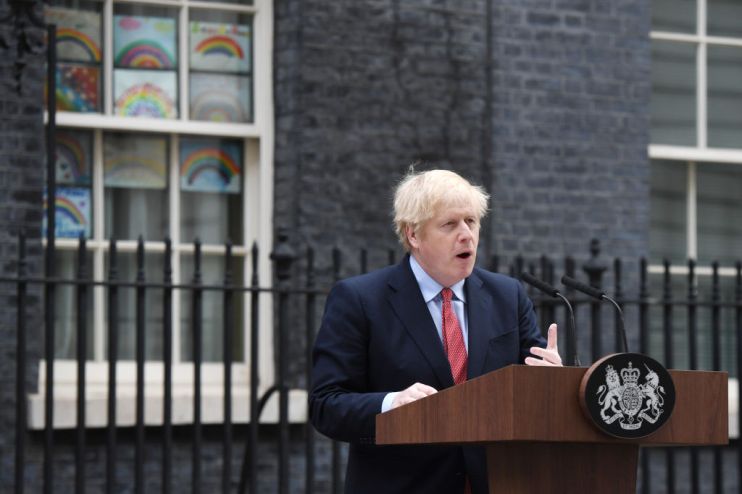Boris Johnson: Lifting UK lockdown too early would spell ‘economic disaster’

Prime Minister Boris Johnson today warned the UK could face an “economic disaster” if the lockdown ends too early, urging businesses to be patient as he returned to Downing Street.
The Prime Minister said the UK was “beginning to turn the tide” on coronavirus. But he cautioned against lifting the coronavirus lockdown restrictions too early, saying it risks both a new wave of deaths and an “economic disaster” for the UK.
Speaking publicly for the first time since being discharged from hospital after contracting coronavirus, Johnson said: “I can see the long term consequences of lockdown as clearly as anyone. And so yes, I entirely share your urgency. It’s the government’s urgency.
“And yet we must also recognise the risk of a second spike, the risk of losing control of that virus and letting the reproduction rate go back over one, because that would mean not only a new wave of death and disease, but also an economic disaster.”
‘I share your anxiety’, Boris Johnson tells businesses
The Prime Minister urged businesses to remain patient, saying that he shared their “anxiety” as to when they will be able to reopen.
“Let me say directly also to British business, to the shopkeepers, to the entrepreneurs, to the hospitality sector, to everyone on whom our economy depends: I understand your impatience, I share your anxiety.
“And I know that without our private sector, without the drive and commitment of the wealth creators of this country, there will be no economy to speak of. “
Business groups such as the Institute of Directors (IoD) have called for more clarity from the government as to how and when restrictions for firms might be lifted.
The IoD’s poll of members today showed bosses were at their most pessimistic about their firms’ prospects since the survey began in 2016.
But the PM said if the UK lockdown ends too early, a second wave of coronavirus infections would prompt a second period of quarantine.
“We would be forced once again to slam on the brakes on the whole country and the whole economy and reimpose restrictions in such a way that leads to more and lasting damage,” Johnson said.
Lockdown to continue but UK close to end of ‘first phase’
Johnson also called on the public to continue with the UK lockdown measures in order to beat the coronavirus outbreak.
“I refuse to throw away all the effort, and the sacrifice of the British people and to risk a second major outbreak and huge loss of life, and the overwhelming of the NHS,” he said.
“I ask you to contain your impatience, because I believe we are coming now to the end of the first phase of this conflict.
“And in spite of all the suffering, we have so nearly succeeded. We defied so many predictions. We did not run out of ventilators or ICU beds, we did not allow our NHS to collapse.”
Johnson added that “we have collectively flattened the peak” a day after the UK saw its lowest number of coronavirus deaths since March.
Yesterday the UK recorded 413 deaths, its lowest in weeks, to take the confirmed coronavirus death toll to 20.732. The daily infection rate also fell as the UK hit 154,037 confirmed cases in lockdown.
Johnson indicates slower end to lockdown
The government will only move to the second phase of its coronavirus response when it has met five tests set out for handling the original outbreak, Johnson added.
Those five tests include a falling daily death rate and a falling infection rate, as well as not overwhelming the NHS.
They also involve ramping up testing – a key problem for the government, which is struggling to hit a 100,000 daily test target by the end of April. The last test is to ensure the UK avoids a second peak in coronavirus cases.
“When we’re sure that will be the time to move on to the second phase in which we continue to suppress the disease, and keep [the virus] reproduction rate down,” he said.
He said the government would then look to “fire up the engines, one by one, of this great UK economy”.
He said that the government would act with as much transparency as possible when it came to sharing its decision making processes with the public.
“We will also be reaching out to build the biggest possible consensus across business, across industry, across all parts of our United Kingdom and across party lines, bringing in opposition parties”, he added.
However, it is not clear how long that will take. Outside Downing Street today Johnson declined to offer a timeline for the UK lockdown to end.
“We simply cannot spell out how fast or slow or even when those changes will be,” the PM said. “We will be relying as ever on tube science to inform us as we have from the beginning.”
Boris Johnson returns to work
The Prime Minister returned to work today after three weeks of fighting off a coronavirus infection that could have killed him.
After confirming his positive diagnosis on Twitter and self-isolating above 11 Downing Street, Johnson spent days in intensive care and later said it “could have gone either way”.
Today he faces key decisions on how the government will act to tackle the UK coronavirus outbreak and questions over the length of lockdown.
Over the weekend, the UK death toll passed 20,000, surpassing the figure that chief medical officer Chris Whitty had said would represent a “good outcome” for the country.
First the PM will chair a so-called war cabinet on coronavirus before holding individual talks with ministers on individual departments’ progress.
He will also meet with experts to discuss changing the UK coronavirus lockdown before the government’s next legal review of the measures on 7 May.
While the government may modify the UK lockdown before the next review, it is unlikely to lift coronavirus restrictions.